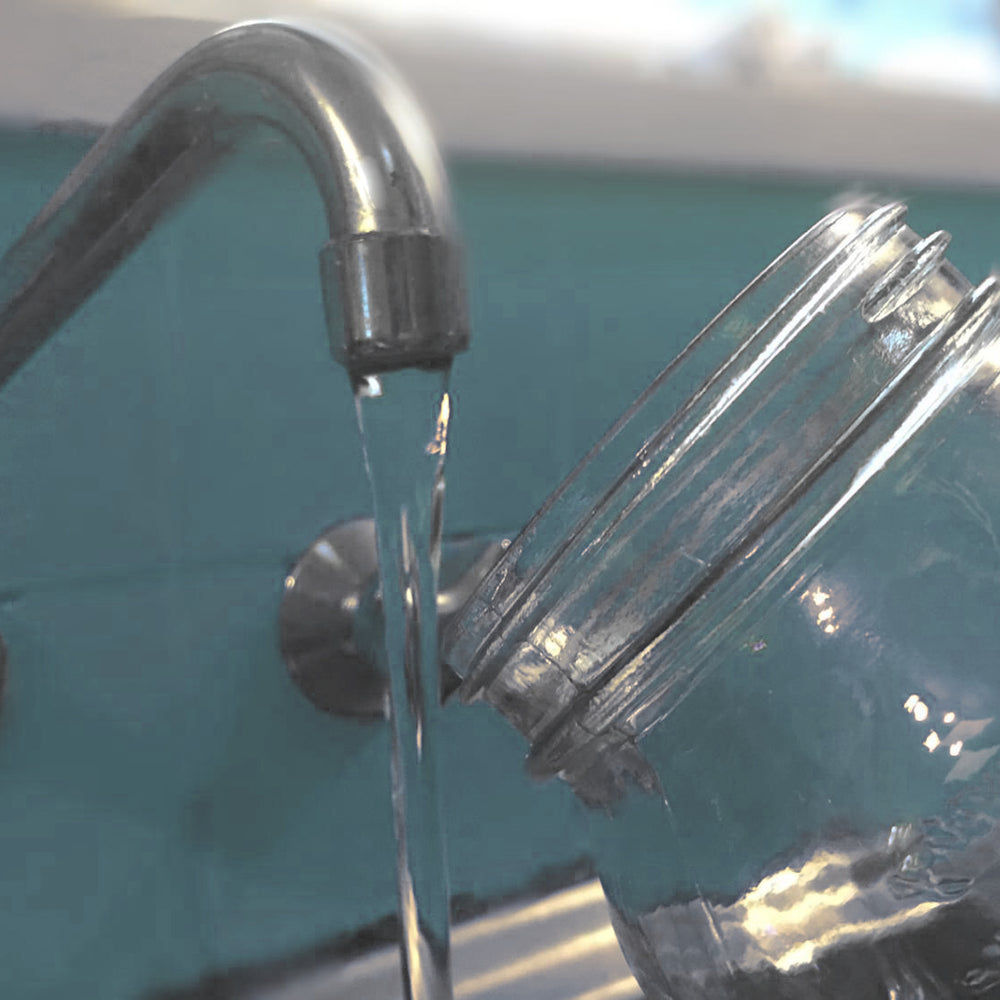
The short answer is surprisingly, yes. Water kefir grains and ginger beer plant will survive tap water with all that chlorine, chloramine, fluoride, THM’s, HAA’s, anti-depressants, and other contaminants. Not only will it survive, it will do somewhat okay on a long-term basis, especially with a mineral rich sugar recipe.
We are lucky to have access to local artisan well water and our grains thrive and flourish on the clean, yet mineral rich rocky mountain water. My first recommendation for water kefir grains is clean / tested well water or real spring water (not from a bottle). For water kefir, the more minerals in the water, the better it typically does. A good spring or mineral water can work well too, but it can be costly.
Tap water is the easiest and cheapest and generally has decent minerals – more so than many brands of spring water. The problem is the chlorine, fluoride, the by-products of the disinfection process and all the other contaminates.
Water kefir grains are surprisingly hardy and can handle tap water without too much issue. We’ve tested tap water in multiple states as well as heard back from others that, yes, the grains can survive and handle untreated tap water on a long-term basis.
I don’t know of any study, but it wouldn’t surprise me in the least to learn that after fermenting untreated tap water, that tap water ferment is cleaner and more suitable for consumption.
If you are set on using tap water, there are ways to clean, and improve the quality of the water for both the grains and ultimately yourself:

Off-gassing / evaporation method to remove chlorine:
Let the water sit for at least 12 hours and much of the chlorine will evaporate. Unfortunately it does not lower the level of chloramine which is present in most tap water supplies.

Boiling method to remove chlorine:
Boil for 15-20 minutes to help remove most of the chlorine. Faster than the evaporation method. Boil for 15-20 minutes to help remove most of the chlorine. Like the off-gassing method, it does not remove chloramine.

Using molasses or lemon to neutralize chlorine and chloramine
Tim Wilson, an expert on soil biology, claims that molasses is the key to neutralizing tap water. He believes that molasses or lemon will instantly neutralize both chlorine AND chloramine. The method is simply to mix atleast 1/8th teaspoon of molasses into the tap water before adding the grains. Someone else tested 1/4 teaspoon of molasses in one gallon of tap water and found that within 3 minutes, there was no detectable level of chlorine or chloramine. Or as an alternative, simply squeeze some fresh lemon into a jar of water before adding the grains.

Activated carbon filter
Carbon filters like Brita are quite good at both removing cholrine as well as some of the by-products of chlorine (which may be worse than the chlorine itself). In one study it significantly removed THM and HAA (by products of cholrine), but certainly not all of it. Also, it’s also partially effective against chloramine and not very effective against fluoride. Even though the companies claim that they don't remove minerals, I suspect some essential minerals are lost in the process. We've tested Brita and similar filters and compared them directly to tap water, and the tap water grains actually did better. I strongly suspect some lost of essential minerals. Even though the grains still perform and grow significantly better than Reverse Osmosis (RO) or similar filtering, it wouldn’t hurt to add a little baking soda or dolomite or some supplement with essential minerals if you are looking to get the best out of your grains.

Reverse Osmosis and other stronger filters
If you are looking to get even cleaner tap water, you could try a good RO filtration system with a fluoride filter. It will help remove much more of the chloramine and fluoride, but it will also take out most of the minerals the grains love. You would need to supplement the minerals back with a good mineral supplement that’s calcium rich (add items). Just keep in mind that it can be hard to replace the essential minerals lost from the highly filtered systems. It seems that water that still had its own natural minerals tends to just work better for the grains.
Bottom Line
Well water, a good spring or mineral water is best, but water kefir grains can ferment with tap water if desired. The grains will survive even fairly high levels of chlorine, chloramine, fluoride, and other contaminates.
If you are comfortable drinking tap water, my recommendation for treating the water would simply be to use the molasses method due to its ability to help neutralize even the chloramine without taking away from the mineral content that the grains love so much.
If you are looking to cleanse the water of all its sins, your best best is to invest in a good filtration system with a fluoride filter. However, you do run into the issue of having to replace lost minerals. At that point, it may work better to simply locate a good well or mineral water source.
The bottom line is that we don’t generally like to advocate the use of tap water (for obvious reasons), but if you are comfortable drinking untreated tap water or lightly filtered tap water, then the grains should be fine as well. Use mineral rich sugar (with molasses content) and/or lemon to further help combat the chlorine and chloramine.


Comments
Robin
Good article and good to hear – but what about the fluoride? Seems only carbon filters work there. Bought-and-paid-for ‘health professionals’ (including dentists) continue to proclaim fluoride’s ‘many health benefits’ they say filtering drinking water effectively denies, but it’s an argument deserving of short shrift from anyone who knows the origins of fluorinated drinking water, which are anything but above suspicion. Thanks for the info.
July 30, 2022
Yemoos Nourishing Cultures
Smith – Carbonated mineral water seems to have a more neutral effect on the grains as it doesn’t seem to help or hurt the grains.
July 12, 2021
Smith
Would carbonated mineral water be a positive or negative for the grains? I cant seem to find any info on if the carbonization would hurt it or not.
July 12, 2021
Vijaya Joshi
great information
nice to know I CAN USE TAP WATER – SO NO FRETTING
November 14, 2019
Leave a comment